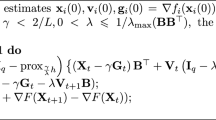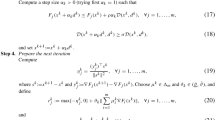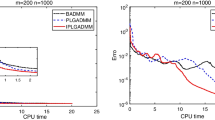Abstract
In this paper, an indirect dual ascent method with an exponential convergence rate is proposed for a general resource allocation problem with convex objectives and weighted constraints. By introducing the indirect dual variables, the dual dynamics can be executed in a decentralized manner by all nodes over the network. In contrast to the conventional methods, consensus on all the dual variables is not required. This further leads to the fast convergence, reduced communication burden and better privacy preserving. Moreover, the exponential convergence rate of the proposed algorithm is established through the Lyapunov method and the singular perturbation theory. Application of the dynamic power dispatch problem in smart grid verifies the effectiveness and performance of the proposed algorithm.









Similar content being viewed by others
References
Li, C., Yu, X., Yu, W., Huang, T., Liu, Z.W.: Distributed event-triggered scheme for economic dispatch in smart grids. IEEE Trans. Ind. Inform. 12(5), 1775–1785 (2016)
Li, C., Yan, X., Xinghuo, Y., Ryan, C., Huang, T.: Risk-averse energy trading in multienergy microgrids: a two-stage stochastic game approach. IEEE Trans. Ind. Inform. 13(5), 2620–2630 (2017)
Li, C., Liu, C., Deng, K., Xinghuo, Y., Huang, T.: Data-driven charging strategy of pevs under transformer aging risk. IEEE Trans. Control Syst. Technol. 26(4), 1386–1399 (2017)
Baingana, B., Mateos, G., Giannakis, G.B.: Proximal-gradient algorithms for tracking cascades over social networks. IEEE J. Sel. Topics Signal Process. 8(4), 563–575 (2014)
Mateos, G., Giannakis, G.B.: Distributed recursive least-squares: stability and performance analysis. IEEE Trans. Signal Process. 60(7), 3740–3754 (2011)
Lesser, V., Ortiz Jr., C.L., Tambe, M.: Distributed Sensor Networks. Springer, New York (2003)
Martinez, S., Bullo, F., Cortes, J., Frazzoli, E.: On synchronous robotic networkspart i: models, tasks, and complexity. IEEE Trans. Autom. Control 52(12), 2199–2213 (2007)
Wang, H., Liao, X., Huang, T.: Accelerated consensus to accurate average in multi-agent networks via state prediction. Nonlinear Dynamics 73(1–2), 551–563 (2013)
Huang, Y., Jia, Y.: Fixed-time consensus tracking control of second-order multi-agent systems with inherent nonlinear dynamics via output feedback. Nonlinear Dynamics 91(2), 1289–1306 (2018)
Liu, X., Ho, D.W.C., Song, Q., Cao, J.: Finite-/fixed-time robust stabilization of switched discontinuous systems with disturbances. Nonlinear Dynamics 90(3), 2057–2068 (2017)
Nedić, A., Ozdaglar, A., Parrilo, P.A.: Constrained consensus and optimization in multi-agent networks. IEEE Trans. Autom. Control 55(4), 922–938 (2010)
Boyd, S., Parikh, N., Chu, E., Peleato, B., Eckstein, J., et al.: Distributed optimization and statistical learning via the alternating direction method of multipliers. Found. Trends Mach. Learn. 3(1), 1–122 (2011)
Duchi, J.C., Agarwal, A., Wainwright, M.J.: Dual averaging for distributed optimization: convergence analysis and network scaling. IEEE Trans. Autom. Control 57(3), 592–606 (2011)
Johansson, B., Rabi, M., Johansson, M.: A randomized incremental subgradient method for distributed optimization in networked systems. SIAM J. Optim. 20(3), 1157–1170 (2009)
Nedic, A., Ozdaglar, A.: Distributed subgradient methods for multi-agent optimization. IEEE Trans. Autom. Control 54(1), 48 (2009)
Zhu, M., Martínez, S.: On distributed convex optimization under inequality and equality constraints. IEEE Trans. Autom. Control 57(1), 151–164 (2011)
Wang, X.-Y., Song, J.-M.: Synchronization of the fractional order hyperchaos Lorenz systems with activation feedback control. Commun. Nonlinear Sci. Numer. Simul. 14(8), 3351–3357 (2009)
Wang, X., He, Y.: Projective synchronization of fractional order chaotic system based on linear separation. Phys. Lett. A 372(4), 435–441 (2008)
Wang, X., Wang, M.: Dynamic analysis of the fractional-order Liu system and its synchronization. Chaos Interdiscip. J. Nonlinear Sci. 17(3), 033106 (2007)
Wang, Y., Zhang, H., Wang, X., Yang, D.: Networked synchronization control of coupled dynamic networks with time-varying delay. IEEE Trans. Syst. Man Cybern. Part B (Cybern.) 40(6), 1468–1479 (2010)
Zhang, H., Wang, X.-Y., Lin, X.-H.: Topology identification and module-phase synchronization of neural network with time delay. IEEE Trans. Syst. Man Cybern. Syst. 47(6), 885–892 (2016)
Azin, H., Mohammadi, F., Machado, J.A.T.: A piecewise spectral-collocation method for solving fractional Riccati differential equation in large domains. Comput. Appl. Math. 38(3), 96 (2019)
Pahnehkolaei, S.M.A., Alfi, A., Machado, J.A.T.: Delay independent robust stability analysis of delayed fractional quaternion-valued leaky integrator echo state neural networks with quad condition. Appl. Math. Comput. 359, 278–293 (2019)
Moghaddam, B.P., Dabiri, A., Lopes, A.M., Machado, J.A.T.: Numerical solution of mixed-type fractional functional differential equations using modified Lucas polynomials. Comput. Appl. Math. 38(2), 46 (2019)
Kia, S.S., Cortés, J., Martínez, S.: Distributed convex optimization via continuous-time coordination algorithms with discrete-time communication. Automatica 55, 254–264 (2015)
Gharesifard, B., Cortés, J.: Distributed continuous-time convex optimization on weight-balanced digraphs. IEEE Trans. Autom. Control 59(3), 781–786 (2014)
Yi, P., Hong, Y., Liu, F.: Initialization-free distributed algorithms for optimal resource allocation with feasibility constraints and application to economic dispatch of power systems. Automatica 74, 259–269 (2016)
Deng, Z., Liang, S., Hong, Y.: Distributed continuous-time algorithms for resource allocation problems over weight-balanced digraphs. IEEE Trans. Cybern. 99, 1–10 (2017)
Li, C., Yu, X., Huang, T., He, X.: Distributed optimal consensus over resource allocation network and its application to dynamical economic dispatch. IEEE Trans. Neural Netw. Learn. Syst. 29, 1–12 (2017)
He, X., Ho, D.W.C., Huang, T., Yu, J., Abu-Rub, H., Li, C.: Second-order continuous-time algorithms for economic power dispatch in smart grids. IEEE Trans. Syst. Man Cybern. Syst. 48(9), 1482–1492 (2018)
Bai, L., Ye, M., Sun, C., Hu, G.: Distributed economic dispatch control via saddle point dynamics and consensus algorithms. IEEE Trans. Control Syst. Technol. 27, 1–8 (2017)
Zhu, M., Martinez, Sonia: On distributed convex optimization under inequality and equality constraints. IEEE Trans. Autom. Control 57(1), 151–164 (2011)
Le, X., Chen, S., Yan, Z., Xi, J.: A neurodynamic approach to distributed optimization with globally coupled constraints. IEEE Trans. Cybern. 99, 1–10 (2017)
Cherukuri, A., Mallada, E., Cortés, J.: Asymptotic convergence of constrained primal-dual dynamics. Syst. Control Lett. 87, 10–15 (2016)
Cherukuri, A., Mallada, E., Low, S., Cortés, J.: The role of convexity in saddle-point dynamics: Lyapunov function and robustness. IEEE Trans. Autom. Control 63(8), 2449–2464 (2018)
Cortés, J., Niederländer, S.K.: Distributed coordination for nonsmooth convex optimization via saddle-point dynamics. J. Nonlinear Sci. 29, 1–26 (2018)
Guannan, Q., Li, N.: On the exponential stability of primal-dual gradient dynamics. IEEE Control Syst. Lett. 3(1), 43–48 (2018)
Kia, S.S., Cortés, J., Martinez, S.: Dynamic average consensus under limited control authority and privacy requirements. Int. J. Robust Nonlinear Control 25(13), 1941–1966 (2015)
Boyd, S., Vandenberghe, L.: Convex Optimization. Cambridge University Press, Cambridge (2004)
Khalil, H.K.: Nonlinear Systems, 3rd edn. Prentice-Hall Inc., Upper Saddle River (2002)
IEEE 30-Bus Test Case. https://www.ee.washington.edu/research/pstca/pf30/pg_tca30bus.htm/ (1961). Accessed 31 Dec 1961
Acknowledgements
This work is supported by the National Natural Science Foundation of China under Grants 61773172, 61572210 and 51537003, the Natural Science Foundation of Hubei Province of China (2017CFA035), the Fundamental Research Funds for the Central Universities (2018KFYYX-JJ119), the Program for HUST Academic Frontier Youth Team and the 111 Project on Computational Intelligence and Intelligent Control under Grant B18024 and the Australian Research Council under Grant DP170102303.
Author information
Authors and Affiliations
Corresponding author
Ethics declarations
Conflicts of interest
The authors declare that they have no conflict of interest.
Additional information
Publisher's Note
Springer Nature remains neutral with regard to jurisdictional claims in published maps and institutional affiliations.
Submitted to Nonlinear Dynamics, May 2019.
Rights and permissions
About this article
Cite this article
Lin, WT., Wang, YW., Li, C. et al. Distributed resource allocation: an indirect dual ascent method with an exponential convergence rate. Nonlinear Dyn 102, 1685–1699 (2020). https://doi.org/10.1007/s11071-019-05376-w
Received:
Accepted:
Published:
Issue Date:
DOI: https://doi.org/10.1007/s11071-019-05376-w




